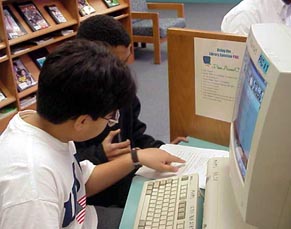 WebQuests
WebQuests  Work
Work
If you have not heard about WebQuests yet, then cool!
It's awesome to bring this kind of information to your colleagues for the
first time and to be able to be the first one to start implementing a new
teaching strategy within your classroom or school. If you *have*
heard of them before, but have not yet tried them in your classroom, this
page should help. Because, the WebQuest has changed everything that I used
to think of when I planned to use the Internet with a group of students.
Yes, it's that earthshaking and impressive! And really, I am not exaggerating
here!
There are so many great sites already dedicated
to WebQuests that it can be a little overwhelming! My goal with this page
is to just introduce you to the concept, show you where to find some great
WebQuest sites and lists, and give you a few pointers on how you can start
to use them effectively in your classrooms. Most of the links will be provided
within the text, before or after quoted text, or as a list of hot links.
Whenever you want to read more about a topic, click on the link for more
information, just remember to come on back!
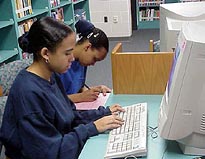
According to the WebQuest Page a WebQuest is:
"an inquiry oriented activity in which most or all of the information used by learners is drawn from the Web. WebQuests are designed to use learners' time well, to focus on using information rather than looking for it, and to support learners' thinking at the levels of analysis, synthesis and evaluation. The model was developed in early 1995 at San Diego State University by Bernie Dodge with Tom March, and was outlined then in Some Thoughts About WebQuests"The most important thing to realize about WebQuests is that they are product or task oriented, which is great for those of us who are ever striving to make that MSPAP connection. To understand this, one has to think of the WebQuest Taskonomy, or the Taxonomy of Tasks.
"The task is the single most important part of a WebQuest. It provides a goal and focus for student energies and it makes concrete the curricular intentions of the designer. A well designed task is doable and engaging, and elicits thinking in learners that goes beyond rote comprehension"So basically, students will be producing something, not just going on the Internet and searching or even worse, surfing around aimlessly hoping to find that one gold nugget of pertinent information that they need for a task. All the nuggets have already been found! The WebQuest takes the learner to the exact site where the information can be found and the student has a clear set of directions as to what to do with that information. It is the very fact that the components of the WebQuest have the introduction, research, task, the evaluation *and* ALL the resources built in that makes the work so engaging and meaningful. For more information and as another introduction, read the excellent article written by Tom March that answers the question: Why WebQuests?
"Successful WebQuests always include six main components:
- A clear introductory paragraph which sets the stage for the activity and provides some background information. This paragraph should also engage the student's interest and enthusiasm for the task.
- A central task that is concrete and interesting.
- A set of information sources needed to complete the task. All of the knowledge sources, both from online and real world sources, should be given to the students in the form of a WebQuest handout. These pointers to information are vital and ensure that your students are centered on the task at hand.
- A description of the entire process the students should go through in accomplishing the task.
- Guidance on how to organize the information acquired. This can take the form of guiding questions, or directions to complete organizational frameworks such as timelines, concept maps, etc., ultimately resulting in the creation of new Web pages to demonstrate their understanding.
- A conclusion that brings closure to the WebQuest reminds the students about what they've learned, and encourages them to extend the experience into other domains.
- The end result of a WebQuest is publishing the results of your students' thinking processes on the Internet in the form of Web pages. This online publishing serves three purposes:
- It focuses the learners on a tangible and hi-tech task.
- It gives them a receptive, sympathetic audience to create for.
- It opens up the possibility of getting feedback from that distant audience if you include a return email address on the Web material"
------>>Back to Table of Contents
The first thing you want to decide is: are you going to make up your own WebQuest or use one already designed and online that fits your lesson? If you want to make your own web site I recommend that you use a Template, after all, why re-invent the wheel, right? It would also help to do some more research by visiting the WebQuest Training Materials page. And if you want to use WebQuests already online, see below.
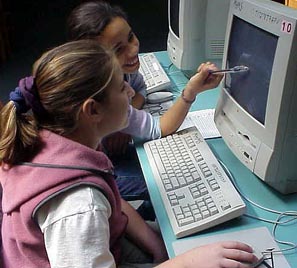
WebQuest Helpers
and Examples
There are many types of WebQuests, and some better than others. New
ones are being created and posted daily. A search of the term WebQuest
on AltaVista today yielded 108,150 pages found.
Matrix of WebQuest Examples- the ultimate guide to some of the best WebQuests created. Seven Steps for Better Searching- a terrific guide on how to refine, expand, and to tailor your web searches- with an interactive quiz at the end! Regional Education Technology Assistance (RETA) Initiative Why Web Quests? an excellent article by Tom March. WebQuest Index The Designing and Creating a WebQuest Workshop - very good! Rubric for Evaluating WebQuests- learn how to evaluate and grade a WebQuest Web Quest Workshop- a good list of links. (but visually distracting) ------>>Back to Table of Contents
WebQuest ExamplesMulticultural and Global Foods - A WebQuest for Middle School Family and Consumer Science Classes - designed by Linda M. Koudelka, Murray Hill Middle School. Excellent! Searching for China- The Full WebQuest Race to the South Pole Paper or Plastic: An Internet WebQuest on Recycling Ancient Egypt WebQuest The Great Depression A Feudalism WebQuest: Japan and Europe The Crusades WebQuest - 9th grade Spanish Restaurant Menu Webquest - 8th grade - Students get to design their own Spanish restaraunt and menu. Very engaging. Eureka! A WebQuest on Inventions HEI: WebQuest Bookmarks African Art WebQuest Math Hall of Fame WebQuest The Artists' Self Portraits (not a full WebQuest but great subject matter) A Revolutionary WebQuest A Most Faire Kingdom: a Middle Ages WebQuest A Genealogy Quest SimSience: Cracking Dams, Membranes, Fluid Flow and Crackling Noise
A web site devoted to areas of science where computer simulations are at the forefront of discovery w/WebQuests!Comic Strip WebQuest - Excellent, with rubric! Tuskegee Study WebQuest - A WebQuest Exploring The Powerful and their Victims Iditarod WebQuest - Prepare for the Iditarod Sled Dog race in Alaska. Copyright Law (Music) WebQuest - Copyright Law from the perspective of the composer, arranger, performer, lawyer and educator. ------>>Back to Table of Contents
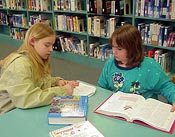
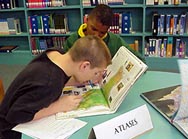
------>>Back to Table of Contents